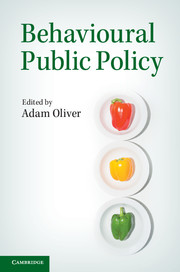Book contents
- Frontmatter
- Contents
- List of Figures
- List of Tables
- List of Contributors
- Introduction
- 1 Ambiguity aversion and the UK government’s response to swine flu
- 2 Models of governance of public services: empirical and behavioural analysis of ‘econs’ and ‘humans’
- 3 From irresponsible knaves to responsible knights for just 5p: behavioural public policy and the environment
- 4 The more who die, the less we care: psychic numbing and genocide
- 5 Healthy habits: some thoughts on the role of public policy in healthful eating and exercise under limited rationality
- 6 Confessing one’s sins but still committing them: transparency and the failure of disclosure
- 7 How should people be rewarded for their work?
- 8 Influencing the financial behaviour of individuals: the mindspace way
- 9 Decision analysis from a neo-Calvinist point of view
- Index
- References
Introduction
Published online by Cambridge University Press: 05 June 2014
- Frontmatter
- Contents
- List of Figures
- List of Tables
- List of Contributors
- Introduction
- 1 Ambiguity aversion and the UK government’s response to swine flu
- 2 Models of governance of public services: empirical and behavioural analysis of ‘econs’ and ‘humans’
- 3 From irresponsible knaves to responsible knights for just 5p: behavioural public policy and the environment
- 4 The more who die, the less we care: psychic numbing and genocide
- 5 Healthy habits: some thoughts on the role of public policy in healthful eating and exercise under limited rationality
- 6 Confessing one’s sins but still committing them: transparency and the failure of disclosure
- 7 How should people be rewarded for their work?
- 8 Influencing the financial behaviour of individuals: the mindspace way
- 9 Decision analysis from a neo-Calvinist point of view
- Index
- References
Summary
For much of the nineteenth century, a discursive, almost exclusively theory-driven style of political economy dominated the economics discourse. Among much else, for instance, David Ricardo had stated that the value of a good is proportional to the cost of the labour taken to produce it, Thomas Malthus believed that population growth would inevitably lead to famine, and J. S. Mill and Karl Marx warned that wages would never rise much above subsistence levels. However, in many cases, of course, brilliantly prosecuted, empirical analysis to test the often competing claims was somewhat lacking. Due to the absence of tools to provide seemingly objective answers, the perceived usefulness of political economy for informing and assessing policy was ultimately undermined.
Alfred Marshall aimed to address this state of affairs by making economics more scientific, that is, more testable and tested. Recognizing that the world is complex and changing, and that preconceptions may be less than valid, he undertook ground-breaking empirical work to demonstrate that, in contrast to the forewarnings of Mill and Marx, wages were in fact increasing over time, as a consequence of greater productivity necessitated by competition. Marshall may have paid insufficient attention to the possibility that not all workers receive an equitable share of the fruits of competition, but, by empirically addressing testable theoretical propositions, he revolutionized economics. From that point onwards, mathematical and applied empirical economics superseded political economy as the dominant force within the mainstream economics community.
- Type
- Chapter
- Information
- Behavioural Public Policy , pp. 1 - 15Publisher: Cambridge University PressPrint publication year: 2013



